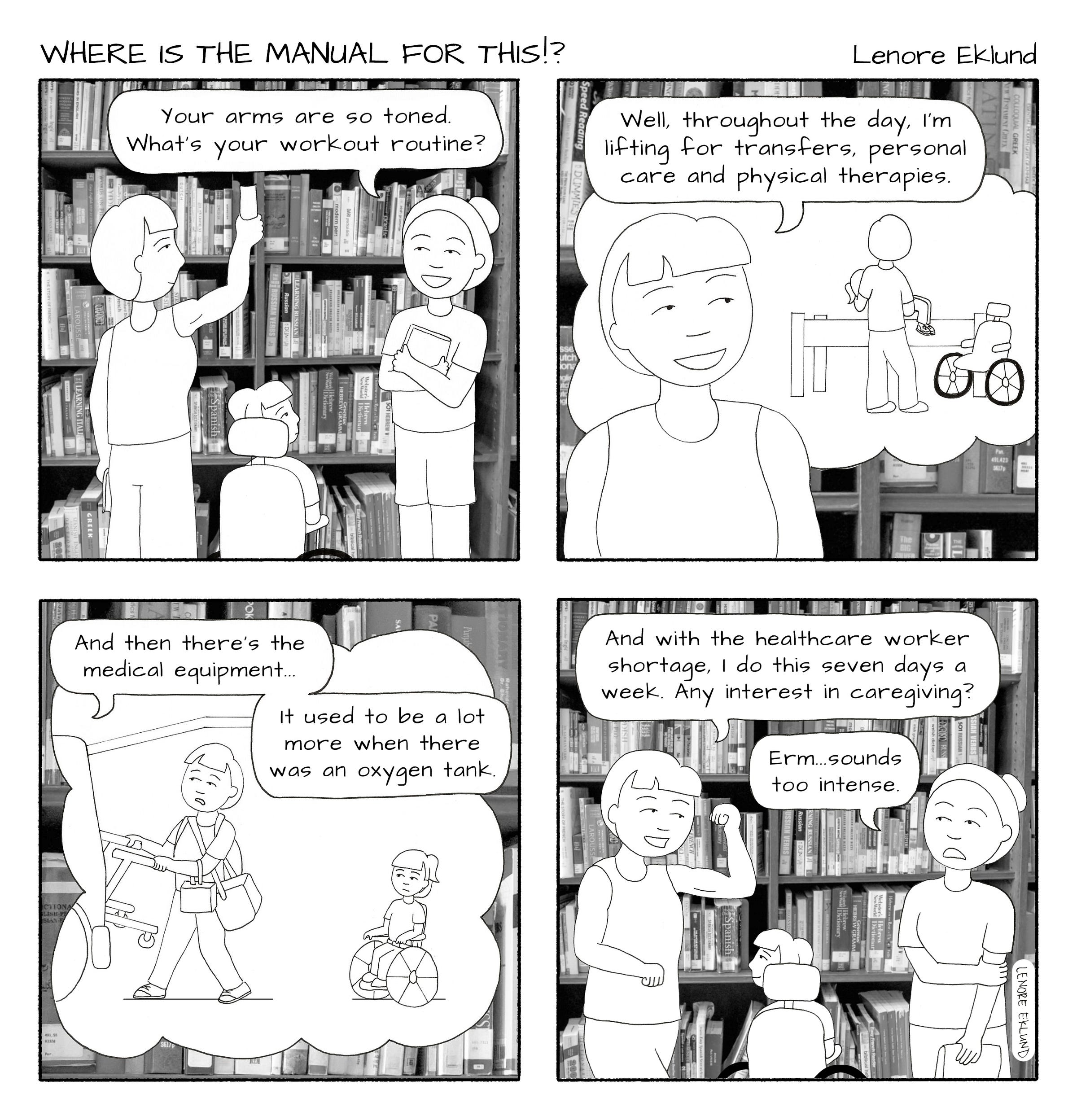Being strong has its advantages! The other day, I was waiting for a long time in the loading dock of a feed store and finally got bored enough to simply load my own 60-pound bale of hay. When you have a 70-pound kid to lift almost everyday, it ain’t no thang. But safe lifting is key! I know I’m just one sudden movement away from a bad back…. What do you do to stay strong?
On the second Sunday of every month, we feature Where is the Manual for This?!, an editorial cartoon about the medical mom life from Lenore Eklund.
Medical Motherhood’s news round up
Snippets of news and opinion from outlets around the world. Click the links for the full story.
• From the Chattanooga Times Free Press (Tennessee): “Department of Children’s Services wrestles with solutions for housing children in state custody”
Three months after the [Tennessee] Department of Children's Services announced it had ended the practice of taking abused and neglected children to state offices overnight, solutions are proving difficult to sustain.
Several faith-based shelters have closed, and some children remain in hospitals for lack of other options.
[…] Children with acute and ongoing needs — those with tracheotomies, in wheelchairs, with developmental disabilities, with mental health needs waiting on a bed in a mental health treatment facility and those with behavioral problems that include violence — are among the most difficult to care for at any point they come into state custody.
DCS has worked with the state's Department of Intellectual and Developmental Disabilities to begin transferring children with high medical needs out of hospitals and into Tennessee Strong Homes, former small residential facilities that had previously housed people transitioning out of state-run institutions that closed down nearly a decade ago.
The children being moved to those facilities are medically fragile with chronic health conditions that may confine them to wheelchairs, require feeding or breathing tubes, may have vision, hearing or communication challenges and are often developmentally disabled, according to Dr. Deborah Lowen, Deputy Commissioner of Child Health for DCS.
The homes are a temporary way station until children can be reunified with families or enter foster care, with DCS footing the bill for room and board while TennCare, the state's Medicaid program, covers the cost of medical care.
Child advocates say they're concerned about moving children to facilities staffed by professional caregivers, instead of families.
"We know children do better in families and communities," said Michele Johnson, executive director of the Tennessee Justice Center, which advocates for children's access to safety net programs, including health care. "It's taking them away from parents and any sense of normalcy ... Who is advocating for these children to grow up in communities?"
In her work trying to connect families with TennCare, Johnson said she often hears about parents' struggles to get in-home services covered for severely ill or disabled children. Some families have been encouraged to turn their children over to DCS to get them the care they need, she said. […]
• From Chalkbeat Chicago: “What education bills did Illinois lawmakers pass? Student mental health help, book ban prohibition, Native American history”
Illinois lawmakers passed a number of education bills at the end of the legislative session that will directly impact what children learn in classrooms across the state and what services they can access.
Lawmakers dedicated more state funding to early childhood education, pushed for a plan to change how reading is taught, and passed policy aimed at increasing access to mental health services for students. The general assembly also approved a $50.6 billion budget for 2024 that touted an additional $570 million for K-12 education and more funding to help students pay for higher education. Gov. J.B. Pritzker signed the budget into law […June 7….]
[Among the bills passed were:]
Career and Technical Education and dual credit opportunities for students with disabilities: House Bill 3224 will require school districts to provide a student and parent with information about career and technical education opportunities and dual credit courses. If the student is enrolled in a dual credit course, it must be included as part of the student’s transition Individualized Education Program activities.
Task force on children’s mental health: Senate Bill 0724 will make it easier for families to access mental health services across several of the state departments, including the Illinois State Board of Education. This bill will create the Interagency Children’s Behavioral Health Services Act and require the state to establish a Children’s Behavioral Health Transformation Officer who will lead the state’s effort to work across state agencies to help families get services. This bill unanimously passed both chambers of the general assembly with bipartisan support.[…]
• From the Montreal Gazette (Canada): “Road tripping is a different kind of journey with a disabled child”
At the end of the first day, Liam Défossés spiked a fever. He and his family — dad Yan, mom Emmanuelle and big brother Malou — were driving to Florida from their home in Sorel.
Families who road trip know fevers and sniffles aren’t unusual when you mess up a child’s routine and add excitement and boredom. Most children get over it quickly. For 10-year-old Liam, a fever could be a matter of life or death.
[…] That means researching every hospital along the route and travelling with Liam’s hefty medical file, his food and specialized stroller. The adapted van is packed with 10 cubic feet of equipment, including a BiPAP machine, a suction machine and another that monitors his pulse and oxygen levels — doubled, because they always travel with backups.
They drove instead of flying because “society isn’t inclusive and doesn’t have many accommodations,” Défossés said. “My son is not a baby, he’s 5 feet tall. You can’t go in the plane with a wheelchair. This is equipment that can cost up to $15,000, and what if when you get off the plane, it’s broken? People have to wear diapers on planes because they don’t have anything to accommodate people who are in wheelchairs. Governments must work to push companies to do more and better.”
[…]Liam has his own ideas about flying. In the spa at home, he floats and can move more easily. The clear next frontier is space, where he knows he can fly. He wants to be the world’s first disabled astronaut.
“He’s the one who has a lot of guts,” Défossés said. “When we have a plan that’s a bit risky, he loves it. Every time we do something he’s not supposed to do, he says, ‘We’re going to make it!’ We follow him.”
[…]Nadine Allard says she sees families like Liam Défossés’s struggle every day, and is discouraged when she hears all the things they need to fight for. Her team in the complex care unit of the Montreal Children’s Hospital follows patients who are medically fragile and who have medical technology at home. They help families navigate the health and social services landscape, which is broken into many different departments and aid organizations.
[…}These programs aren’t adapted for children, she said.
“Everything needs to go in a box. Children don’t go in boxes.”
Medical Motherhood brings you quality news and information each Sunday for raising disabled and neurodivergent children. Get it delivered to your inbox each week or give a gift subscription. Subscriptions are free, with optional tiers of support. Thank you to our paid subscribers!
Follow Medical Motherhood on Facebook, Twitter, TikTok, Instagram or Pinterest. The podcast is also available in your feeds on Spotify and Apple Podcasts. Visit the Medical Motherhood merchandise store.













